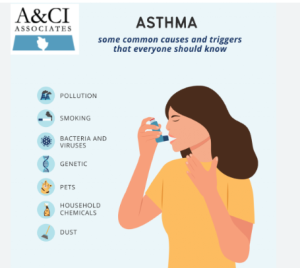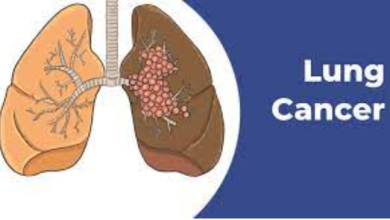Asthma Navigating the Breathless Terrain

Outline
- Introduction
- Definition of asthma
- Prevalence and impact on individuals
- Causes of Asthma
- Genetic factors
- Environmental triggers
- Occupational factors
- Symptoms of Asthma
- Shortness of breath
- Wheezing
- Chest tightness
- Coughing
- Diagnosis and Testing
- Medical history
- Physical examination
- Pulmonary function tests
- Types of Asthma
- Allergic asthma
- Non-allergic asthma
- Exercise-induced asthma
- Treatment Options
- Inhalers and bronchodilators
- Corticosteroids
- Allergy medications
- Lifestyle changes
- Managing Asthma in Children
- Unique challenges
- School and home management strategies
- Preventive Measures
- Identifying triggers
- Creating an asthma action plan
- Regular medical check-ups
- Impact on Daily Life
- Work and school challenges
- Emotional and social aspects
- Holistic Approaches
- Breathing exercises
- Yoga and meditation
- Dietary considerations
- Recent Advancements in Asthma Research
- Innovative treatments
- Emerging technologies
- Asthma and COVID-19
- Risk factors
- Precautions and guidelines
- Support Systems for Asthma Patients
- Support groups
- Online resources
- Myths and Facts About Asthma
- Common misconceptions
- Evidence-based facts
- Conclusion
- Recap of key points
- Encouragement for asthma management

Asthma: Navigating the Breathless Terrain
Asthma, a chronic respiratory condition, affects millions of people worldwide, creating a considerable impact on their daily lives. This article explores the intricacies of asthma, from its causes and symptoms to diagnosis, treatment options, and recent advancements in research. Let’s dive into the breathless terrain of asthma, understanding its nuances and empowering individuals with valuable insights.
Introduction
Asthma is a chronic inflammatory disease that narrows the airways, leading to recurring episodes of wheezing, coughing, chest tightness, and shortness of breath. Its prevalence is on the rise globally, affecting people of all ages. The impact of asthma goes beyond physical discomfort, influencing work, school, and social aspects of an individual’s life.
Causes of Asthma
Understanding the root causes of asthma is crucial for effective management. Genetic predispositions, environmental triggers such as pollutants and allergens, and occupational factors contribute to the development of asthma. Exploring these causes helps individuals make informed choices to mitigate their risk.
Symptoms of Asthma
Recognizing the symptoms of asthma is the first step towards seeking appropriate medical attention. Shortness of breath, wheezing sounds during breathing, chest tightness, and persistent coughing are common indicators. Identifying these signs early allows for timely intervention and management.
Diagnosis and Testing
Medical professionals employ a combination of medical history, physical examinations, and pulmonary function tests to diagnose asthma accurately. A thorough understanding of an individual’s health history aids in tailoring a personalized treatment plan.
Types of Asthma
Asthma manifests in various forms, including allergic asthma triggered by allergens, non-allergic asthma, and exercise-induced asthma. Recognizing the specific type of asthma is pivotal for implementing targeted treatment strategies.
Treatment Options
Inhalers, bronchodilators, corticosteroids, and allergy medications constitute the arsenal of treatment options for asthma. Lifestyle changes, including avoiding triggers and incorporating regular exercise, play a vital role in managing the condition effectively.
Managing Asthma in Children
Children with asthma face unique challenges. Implementing effective school and home management strategies ensures that they can lead active and fulfilling lives while minimizing the impact of asthma on their daily activities.
Preventive Measures
Prevention is as crucial as treatment in asthma management. Identifying triggers, creating a comprehensive asthma action plan, and scheduling regular medical check-ups contribute to proactive asthma care.
Impact on Daily Life
The challenges posed by asthma extend beyond physical symptoms, influencing work, school, and social aspects of daily life. Understanding these challenges helps individuals navigate them successfully.
Holistic Approaches
In addition to conventional treatments, incorporating holistic approaches such as breathing exercises, yoga, meditation, and dietary considerations can complement asthma management, promoting overall well-being.
Recent Advancements in Asthma Research
Ongoing research brings forth innovative treatments and emerging technologies, offering hope for improved asthma management. Staying informed about these advancements empowers individuals to make proactive choices.
Asthma and COVID-19
Asthma patients, particularly those with uncontrolled symptoms, may face increased risks related to COVID-19. This section explores the specific risk factors and precautions individuals with asthma should take in the current global health landscape.
Support Systems for Asthma Patients
Building a robust support system is essential for individuals managing asthma. Joining support groups and accessing online resources provide valuable insights and emotional support, fostering a sense of community.
Myths and Facts About Asthma
Dispelling common misconceptions about asthma with evidence-based facts is crucial for promoting understanding and reducing stigma associated with the condition. Educating the public fosters a supportive environment for individuals living with asthma.
Conclusion
In conclusion, asthma is a multifaceted condition that requires a comprehensive approach to management. From recognizing symptoms and identifying triggers to embracing holistic approaches and staying informed about recent advancements, individuals can take charge of their asthma journey. With the right knowledge and support, living a fulfilling life with asthma is not only possible but achievable.
FAQs
- Can asthma be cured completely?
- While asthma can’t be cured, effective management strategies allow individuals to lead healthy lives.
- Are all types of asthma triggered by allergies?
- No, there are different types of asthma, and not all are allergy-related.
- Can children outgrow asthma?
- Some children may outgrow asthma, but it varies from case to case.
- Is it safe for asthma patients to engage in physical exercise?
- With proper management and guidance, most asthma patients can participate in regular exercise.
- Are there alternative treatments for asthma?
- Some individuals find relief through alternative treatments, but it’s crucial to consult with a healthcare professional before trying them.



